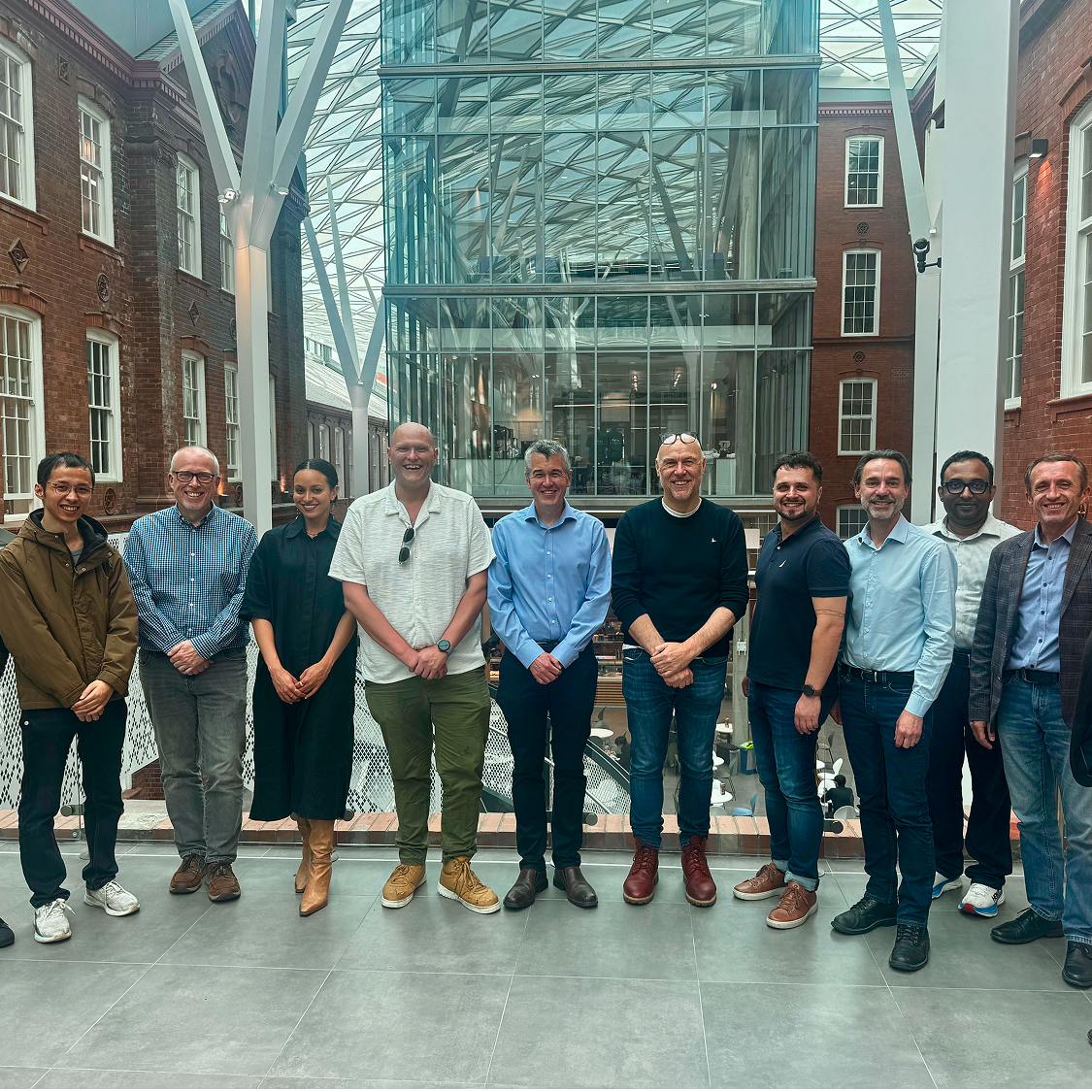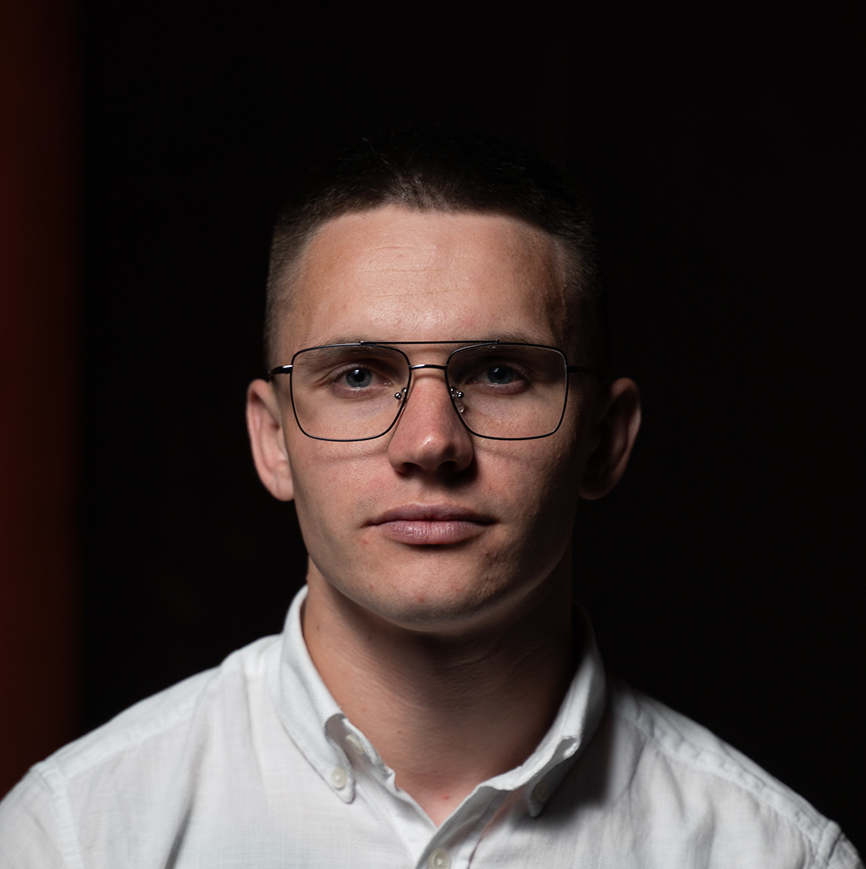Articles
November 4, 2025
On the front lines of reconstruction: Vira Fateiva, Repair Together volunteer
A volunteer builder who joined an all-women construction team to rebuild homes in the de-occupied Ukrainian territory

Regularly ensure no new buildings or trees are casting shadows
Et tellus congue praesent pellentesque volutpat laoreet bibendum ut congue sed libero velit sed suscipit amet mattis orci aliquet egestas nibh quis neque vulputate convallis adipiscing magna. Mattis quisque in feugiat in metus laoreet sodales lectus id augue quis pellentesque feugiat luctus malesuada laoreet bibendum nibh augue fames feugiat diam sed. Varius ut eget sollicitudin sed semper sed semper sed nunc sagittis sit at sit.
- Euismod amet rutrum ornare egestas ac nunc ullamcorper mi pretium
- Mauris aliquet faucibus iaculis dui vitae litum sus ullamco
- Semper pharetra duis purus facilisis nec pretium imperdiet varius
- Molestie eget quis viverra eget eget pulvinar a donec vitae amet
Regularly check the energy output to identify any issues
Sed massa vestibulum lectus suspendisse egestas sit. Interdum vel scelerisque non imperdiet nec euismod enim tristique purus leo fames ut malesuada iaculis nunc ridiculus purus hendrerit mauris netus nunc arcu nulla hac parturient elementum proin. Malesuada commodo mi arcu sit adipiscing turpis nullam dignissim phasellus cras sagittis et sit blandit vestibulum vitae eget nulla vel dictum elementum in feugiat vel volutpat libero porta sed.

Have a professional periodically inspect and service the system
Nibh tellus arcu aliquam in pellentesque ultricies non nisi suspendisse laoreet est felis placerat bibendum nisl fermentum ut et eget lacus lectus aliquet egestas nullam suspendisse vulputate dictum tempus ullamcorper mattis ultrices suscipit ipsum vitae arcu est volutpat suscipit dolor gravida netus massa lacinia maecenas dictum facilisis eu.
- Ut est dui porttitor vitae diam cras faucibus urna diam proin ultrices
- Mauris aliquet faucibus iaculis dui vitae ullamco
- Sapien tempus nec scelerisque praesent mattis vitae commodo
- Justo at dictum fames condimentum nisl tellus mauris fermentum
Be cautious not to put stress on the panels
Nibh tellus arcu aliquam in pellentesque ultricies non nisi suspendisse laoreet est felis placerat bibendum nisl fermentum ut et eget lacus lectus aliquet egestas nullam suspendisse vulputate dictum tempus ullamcorper mattis ultrices suscipit ipsum vitae arcu est volutpat suscipit dolor gravida netus massa lacinia maecenas ictum facilisis eu.
“At scelerisque elementum vitae sed et posuere adipiscing est pulvinar id proin eget posuere odio dictumst mi interdum”
Prevent birds, rodents, and insects from nesting under panels
Sit nulla nec vitae odio orci phasellus metus diam leo est nisi morbi arcu vitae urna sit platea ligula non quis non aliquam in posuere mi egestas nunc ac vitae sed nunc auctor justo orci id ut neque ac nec. In quam eget volutpat urna consequat sit morbi tristique lobortis urna convallis lectus ac.
Follow all guidelines to maintain the warranty validity
Praesent magna turpis tellus nisl tortor est nisl nulla neque sed nisi enim cras in vitae aliquam. Posuere ultrices hac consectetur nulla odio at vitae egestas dis vestibulum risus amet viverra tortor tincidunt nascetur platea ultricies fermentum nibh nulla in lorem lectus adipiscing pretium sit condimentum nullam in eu in lorem cras proin.
The ongoing mobilization efforts and the emphasis on European Union gender policies in Ukraine have further broadened opportunities for women within the workforce.
In 2023, the Employment Service successfully placed 1,200 women in the construction sector, which accounts for 38% of the industry's workforce, representing an increase of 18% since the beginning of the invasion. Furthermore, this trend of female participation is expanding beyond construction; women are increasingly occupying roles as drivers, gas station attendants, loaders, and security personnel throughout Ukraine. Ongoing retraining initiatives are facilitating this transition.
Vira Fateieva, a volunteer with the Repair Together project, shares her experiences working on a construction site. We discussed whether gender biases still exist in this field, how to effectively collaborate with an Irish foreman, laying bricks, and what stereotypes she struggled with during her volunteering.

The Screwdriver and the Great Maidenship
At the beginning of the full-scale invasion, Vira sought ways to help Ukraine. And then she saw that Repair Together (a reconstruction volunteering initiative) was announcing a new project. The idea of the Great Maidenship project was that a destroyed house would be built only by women. Vira expressed a keen interest in the subject matter:
"From my construction experience, I once helped my dad screw. I also did cosmetic repairs in my apartment and my parents' house. But going to a construction site was still scary. However, when I arrived, I realized it's not rocket science. It's interesting and not scary, like a workshop!"
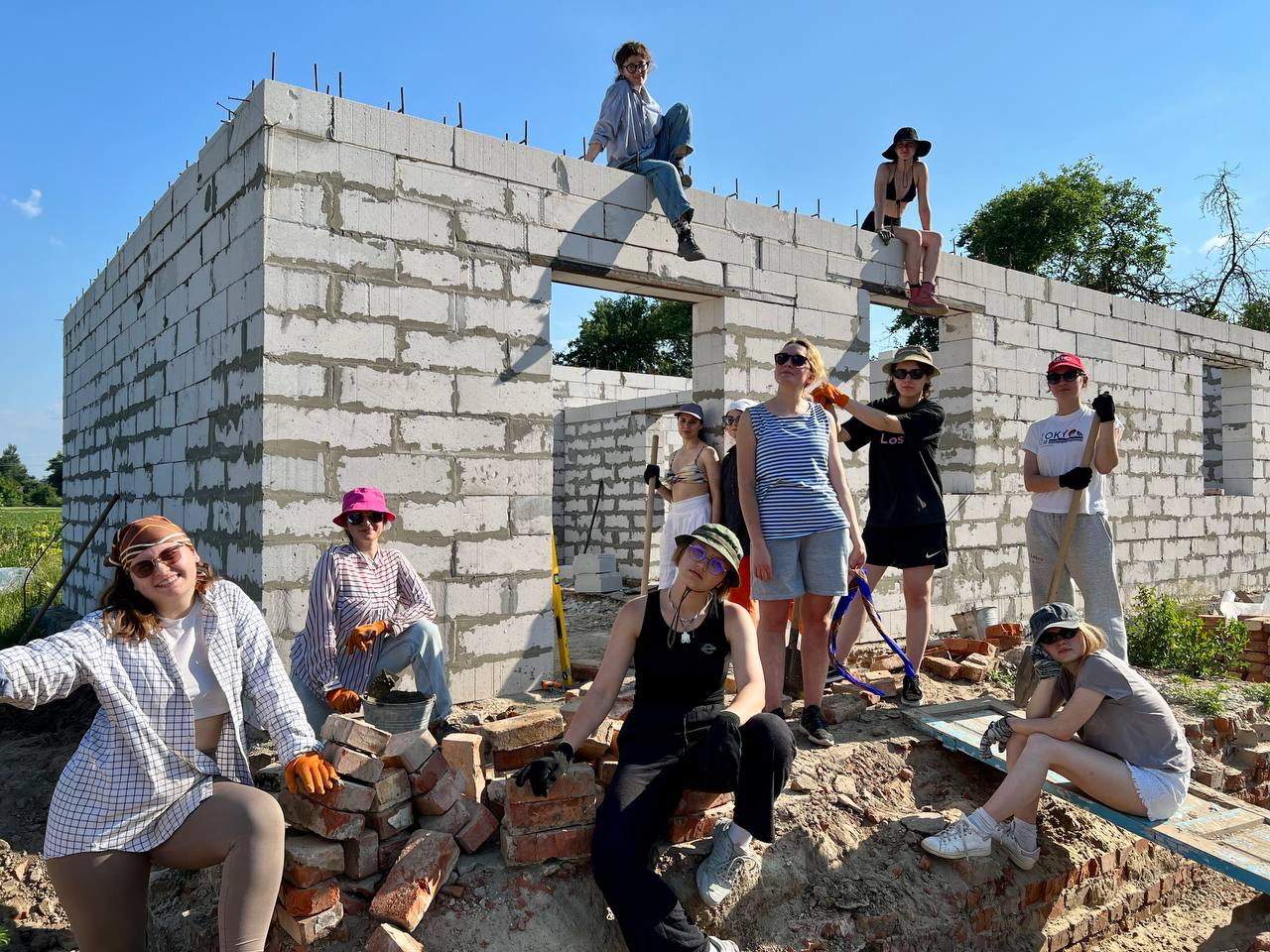
To participate, individuals were required to complete an application form and travel to the village of Lukashivka, located in the recently liberated Chernihiv region. Volunteers resided in a tent over the weekend, spending one night and dedicating two days to work at the construction site.
Construction training was conducted on-site. In the morning, all participants convened and commenced their tasks. The sole male member of the predominantly female team was the foreman, Owen, who hails from Ireland. He provided an overview of the necessary tools and instructed the team on their proper usage.
"Owen explained in Irish-English what we had to do. At first, it was difficult to understand his speech, and all the volunteer girls gathered to inquire, 'Okay, did we get it right?'"
The project faced difficulties in finding a qualified female foreman, a direct consequence of past discriminatory practices that restricted women's access to construction training. Vira believes that persistent toxic masculinity on construction sites creates additional burdens, potentially making the role unsuitable for some women.
"No one should have to fight at work just to be treated adequately!"
Vira contributed to the project after the exterior walls were erected. Her first assignment was to pour the reinforced belt, which bolsters the wall's structure. She then participated in the roof installation.
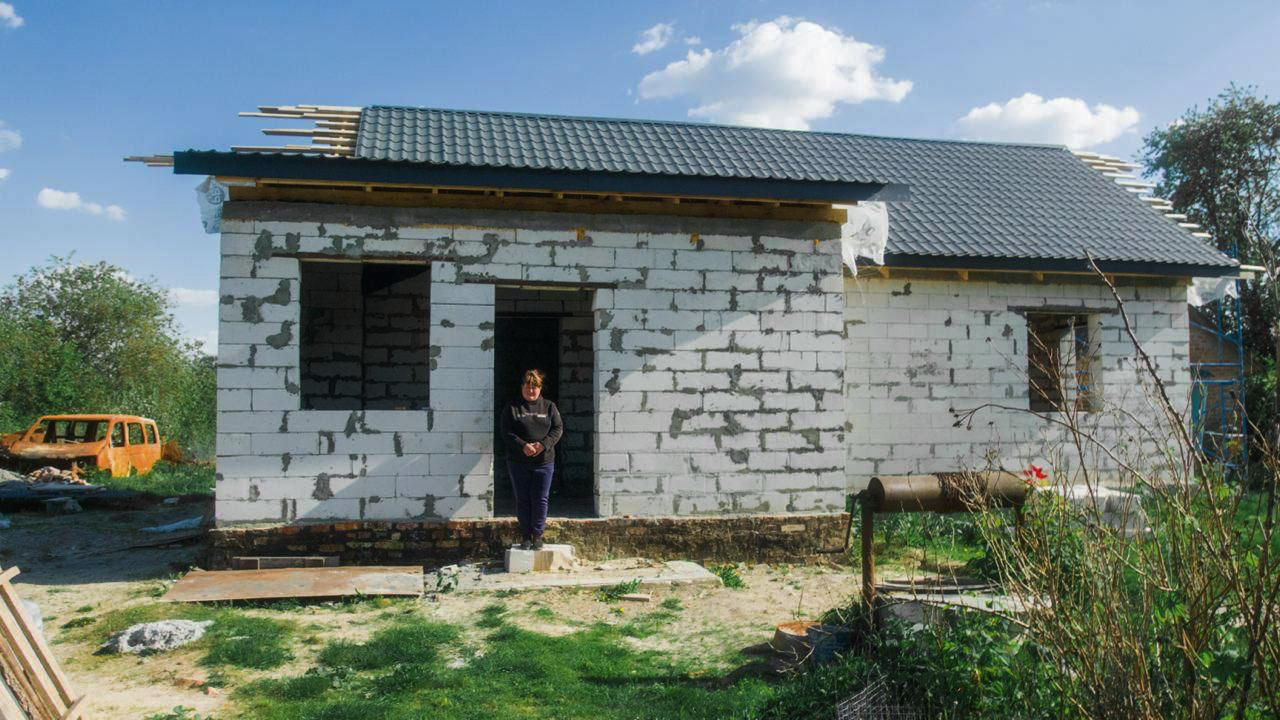
Mrs. Nina's home was selected for rebuilding for compelling reasons. The destruction was extensive, leaving only a fragment of the foundation. More importantly, Mrs. Nina's strength was evident. Even after losing her home and car in a fire, and while raising two children, she continued to run her business, regularly traveling to Kyiv to sell her products.
Vira developed strong bricklaying skills during volunteering and became a teacher to others. She participated in projects with both women-only and mixed-gender teams at Repair Together.
"And there were no prejudices from the foreigners. But from the Ukrainian men... One of them said, 'Now the professional bricklayers will take over. And we'll put Vira next to them to entertain.' It's unpleasant that people still think a woman is a decoration. Who should inspire while the man works?"
Vira appreciates when men share their construction expertise respectfully, without prejudice or condescension. She was particularly pleased to find this approach prevalent during her time with Repair Together, alongside strong support, a sense of community, and valuable knowledge exchange.
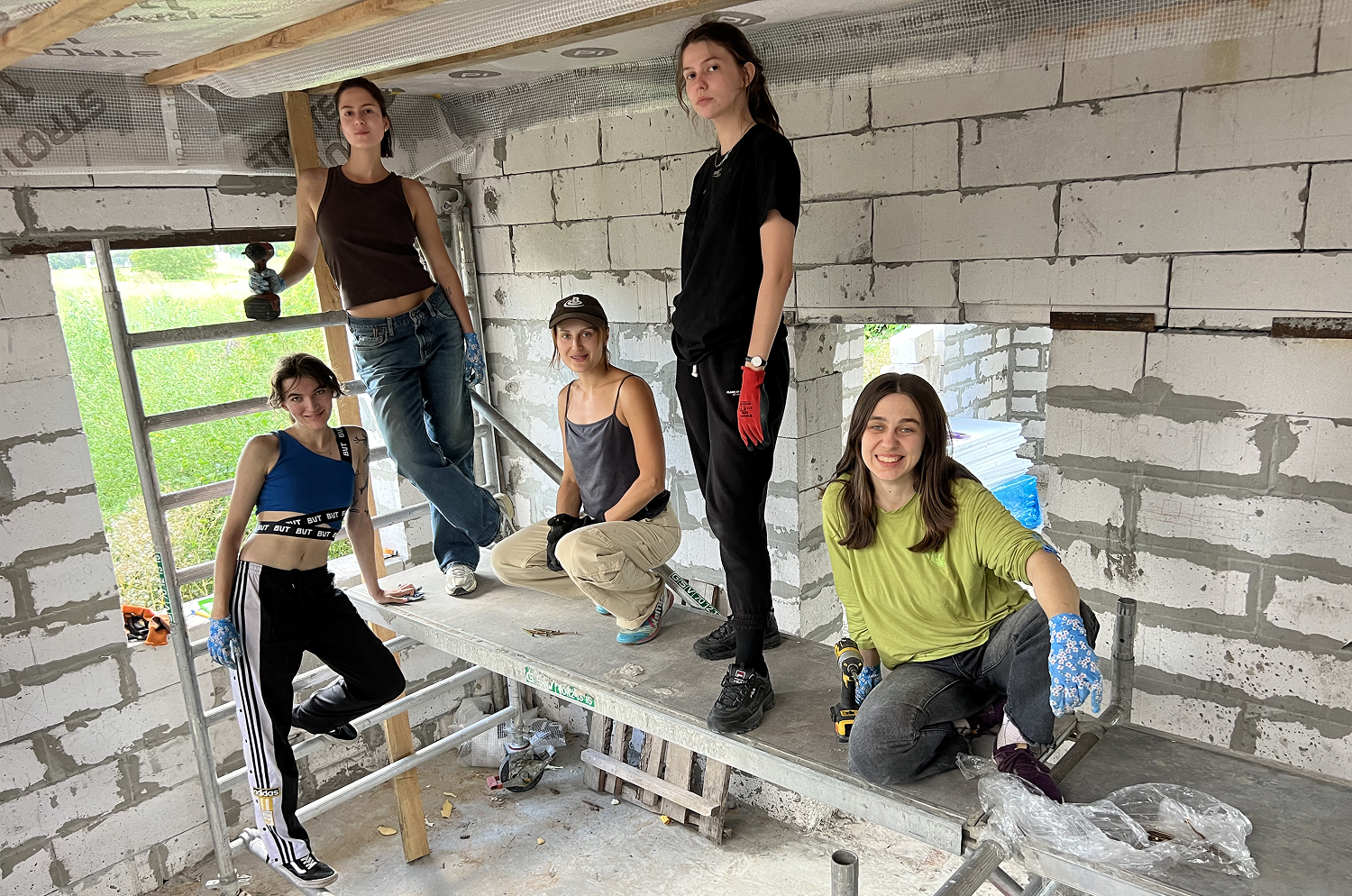
"When I was a student, I dreamed of going to a volunteer camp somewhere abroad, in Africa. And this incredible Inbound! What I was looking for, in Ukraine, here and now."
Vira portrays the international construction camp in Lukashivka as a vibrant tent city. In its first 2023 session, volunteers from Ukraine and the world joined forces to build ten homes for residents, complemented by musical performances, social gatherings, and various workshops.
"After such an experience, there is a feeling that people you've known for a week have been with you for 10 years, and you can rely on them. And also, many couples were formed there: I'm waiting for the first Repair wedding!"

Vira thinks that despite the war's fatigue, volunteering and rebuilding will soon increase in Ukraine. She believes people need mental recovery before physical recovery, and to balance helping others with helping themselves.
"And there is a feeling of national revival in that many people have united to help someone in need. It seems to heal those who help and those who are helped."
"This thought was passed down from childhood: if you work as a builder, it means you didn't get into a normal university.
I would like to normalize the construction profession, fostering less prejudice, more respect, and gratitude in this area. After all, these people build housing. In essence, they did everything around us!"
The ongoing mobilization efforts and the emphasis on European Union gender policies in Ukraine have further broadened opportunities for women within the workforce.
In 2023, the Employment Service successfully placed 1,200 women in the construction sector, which accounts for 38% of the industry's workforce, representing an increase of 18% since the beginning of the invasion. Furthermore, this trend of female participation is expanding beyond construction; women are increasingly occupying roles as drivers, gas station attendants, loaders, and security personnel throughout Ukraine. Ongoing retraining initiatives are facilitating this transition.
Vira Fateieva, a volunteer with the Repair Together project, shares her experiences working on a construction site. We discussed whether gender biases still exist in this field, how to effectively collaborate with an Irish foreman, laying bricks, and what stereotypes she struggled with during her volunteering.

The Screwdriver and the Great Maidenship
At the beginning of the full-scale invasion, Vira sought ways to help Ukraine. And then she saw that Repair Together (a reconstruction volunteering initiative) was announcing a new project. The idea of the Great Maidenship project was that a destroyed house would be built only by women. Vira expressed a keen interest in the subject matter:
"From my construction experience, I once helped my dad screw. I also did cosmetic repairs in my apartment and my parents' house. But going to a construction site was still scary. However, when I arrived, I realized it's not rocket science. It's interesting and not scary, like a workshop!"

To participate, individuals were required to complete an application form and travel to the village of Lukashivka, located in the recently liberated Chernihiv region. Volunteers resided in a tent over the weekend, spending one night and dedicating two days to work at the construction site.
Construction training was conducted on-site. In the morning, all participants convened and commenced their tasks. The sole male member of the predominantly female team was the foreman, Owen, who hails from Ireland. He provided an overview of the necessary tools and instructed the team on their proper usage.
"Owen explained in Irish-English what we had to do. At first, it was difficult to understand his speech, and all the volunteer girls gathered to inquire, 'Okay, did we get it right?'"
The project faced difficulties in finding a qualified female foreman, a direct consequence of past discriminatory practices that restricted women's access to construction training. Vira believes that persistent toxic masculinity on construction sites creates additional burdens, potentially making the role unsuitable for some women.
"No one should have to fight at work just to be treated adequately!"
Vira contributed to the project after the exterior walls were erected. Her first assignment was to pour the reinforced belt, which bolsters the wall's structure. She then participated in the roof installation.

Mrs. Nina's home was selected for rebuilding for compelling reasons. The destruction was extensive, leaving only a fragment of the foundation. More importantly, Mrs. Nina's strength was evident. Even after losing her home and car in a fire, and while raising two children, she continued to run her business, regularly traveling to Kyiv to sell her products.
Vira developed strong bricklaying skills during volunteering and became a teacher to others. She participated in projects with both women-only and mixed-gender teams at Repair Together.
"And there were no prejudices from the foreigners. But from the Ukrainian men... One of them said, 'Now the professional bricklayers will take over. And we'll put Vira next to them to entertain.' It's unpleasant that people still think a woman is a decoration. Who should inspire while the man works?"
Vira appreciates when men share their construction expertise respectfully, without prejudice or condescension. She was particularly pleased to find this approach prevalent during her time with Repair Together, alongside strong support, a sense of community, and valuable knowledge exchange.

"When I was a student, I dreamed of going to a volunteer camp somewhere abroad, in Africa. And this incredible Inbound! What I was looking for, in Ukraine, here and now."
Vira portrays the international construction camp in Lukashivka as a vibrant tent city. In its first 2023 session, volunteers from Ukraine and the world joined forces to build ten homes for residents, complemented by musical performances, social gatherings, and various workshops.
"After such an experience, there is a feeling that people you've known for a week have been with you for 10 years, and you can rely on them. And also, many couples were formed there: I'm waiting for the first Repair wedding!"

Vira thinks that despite the war's fatigue, volunteering and rebuilding will soon increase in Ukraine. She believes people need mental recovery before physical recovery, and to balance helping others with helping themselves.
"And there is a feeling of national revival in that many people have united to help someone in need. It seems to heal those who help and those who are helped."
"This thought was passed down from childhood: if you work as a builder, it means you didn't get into a normal university.
I would like to normalize the construction profession, fostering less prejudice, more respect, and gratitude in this area. After all, these people build housing. In essence, they did everything around us!"
Event Schedule
Lorem ipsum dolor sit amet consectetur. Sit ut gravida aenean potenti. Metus in eu vel morbi dui nunc tellus. Non a massa maecenas massa.

